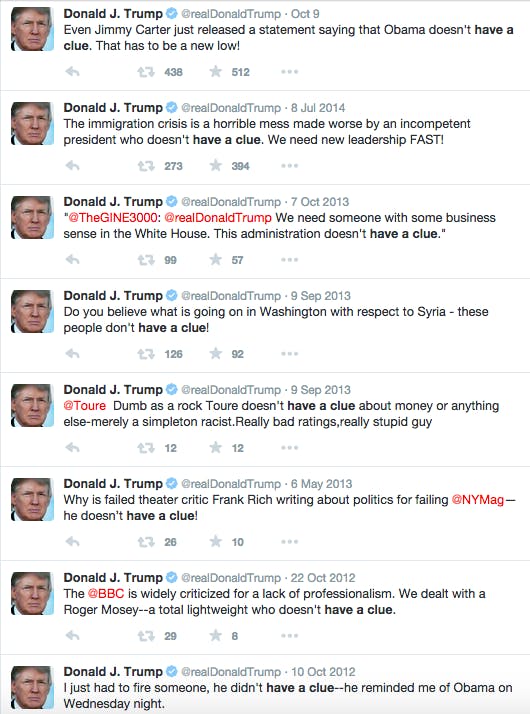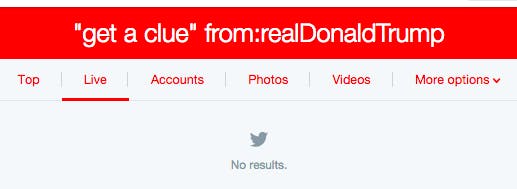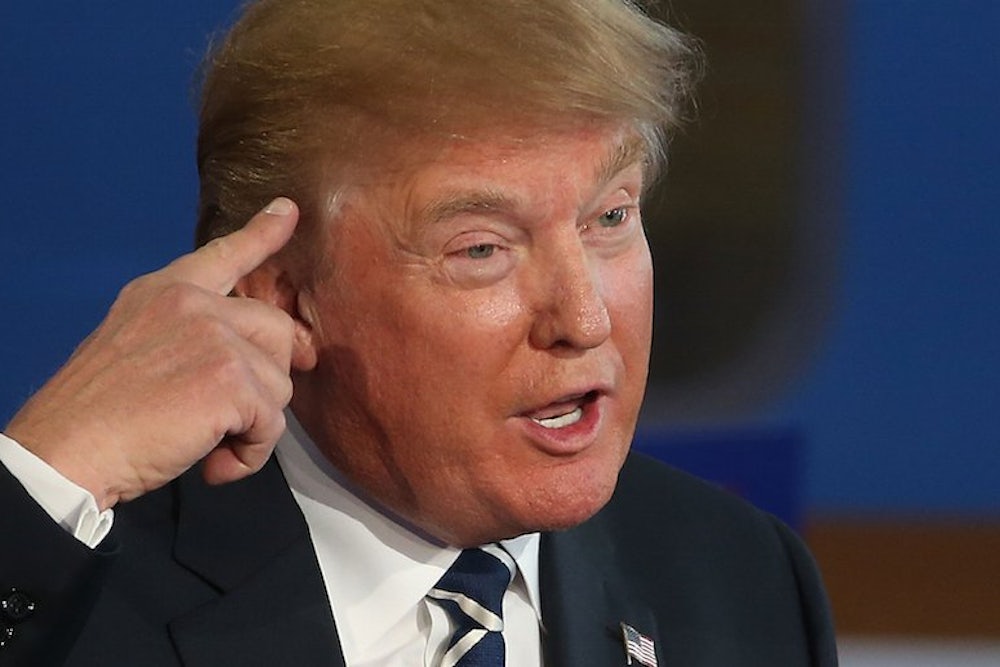Donald Trump is the only man in politics brave enough to stand up and declare that the emperor has no clues. “Our president doesn’t have a clue,” Trump said in his campaign announcement speech. “We have people that don't have, literally do not have a clue,” he said at an NRA convention in April. The clueless rot has trickled down, as Trump explained on ABC’s This Week in August: “I’m going to get great people that know what they’re doing, not a bunch of political hacks that have no idea what they’re doing, appointed by President Obama, that doesn’t have a clue. I mean, that man doesn’t have a clue.”

At the highest levels of American public affairs, the ranks of the clueless run deep. This week, after a brief truce with Fox News, Trump renewed his feud with the network, tweeting that National Review editor “@RichLowry is truly one of the dumbest of the talking heads—he doesn't have a clue!” (Lowry had said Trump talked like a tween, and, to make matters worse, did so as a guest on the show belonging to Trump's nemesis, Megyn Kelly.) The attack rippled through the ranks of the media elite, joining a long line of Trump assults on those lacking clues. “@KarlRove still thinks Romney won! He doesn't have a clue!” he tweeted in June. “I am the BEST builder, just look at what I've built. Hillary can't build. Republican candidates can't build. They don't have a clue!” Trump said in May. Earlier this month, after Kareem Abdul-Jabbar wrote a critical op-ed about the candidate, Trump felt compelled to personally write to the NBA all-time top scorer to inform him that, unfortunately, “The fact is that you don’t have a clue about life and what has to be done to make America great again!”
Trump has tweeted or retweeted at least 24 times that a public figure “has no clue” or “doesn’t have a clue.” But Trump has never tweeted that someone should get a clue. The difference is important.

Observe how he uses the clueless attack on its most frequent target, President Obama. On Fox News in May, Trump argued that Obama is screwing up Syria and the fight against ISIS because he doesn’t have a clue how to fix it. “We have a president that has no clue what he’s doing, there’s no question about that,” Trump said. “All you have to do is look at what’s happened in Iraq with these so-called soldiers—every time we give them $100 million worth of equipment, ISIS or whoever ends up getting it.” Trump is saying our problem in the Middle East wars is one of cluelessness, both writ large (Obama's overall strategy) and writ small (Obama's inability to know whom to trust in Iraq when offering aid in the form of weapons).Given Trump’s reputation for harsh rhetoric and brutal condemnation of all who cross him, this analysis is surprisingly generous. Unlike some critics of the current administration’s foreign policy, Trump does not impugn Obama’s motives. Instead, he blames Obama’s failure on a lack of information.
When Trump says Obama “doesn’t have a clue," he is describing the president’s state of being. If he were to demand that Obama get a clue, he would be suggesting that this state is temporary, that Obama could change. A tweet like "Obama needs to get a clue" would be instructions for the president on how to be better at winning wars. But Trump never tweets this.
So at first, it might seem that Trump's message is a pessimistic one—all clue-missing, no clue-getting. But the argument for Trump's candidacy is that he has the foreign-policy clues—despite never explaining them in detail—and will use them to bring the United States back to good standing in the world. The possibility of American redemption is a question at the heart of Trump's campaign: Is there hope for the clueless? Can they redeem themselves? Can they become beclued?
Trump occasionally betrays a soft spot for the clueless. In a 1997 New Yorker interview, Trump says, “You want to know what total recognition is? I'll tell you how you know you've got it. When the Nigerians on the street corners who don't speak a word of English, who have no clue, who're selling watches for some guy in New Jersey—when you walk by and those guys say, 'Trump! Trump!' That's total recognition."
Clues can be lost, of course. (In that same 1997 New Yorker article, while on the phone with Jesse Jackson, Trump says of Rosie O’Donnell, “She’s terrific.”) But clues can be gained. This is the paradox of Trump. He is a rude mean man who is also a self-help guru with dozens of motivational books, beginning with The Art of the Deal. You can be a winner, too, if you buy this book and get a clue. Or if you vote for me. "I know how to get along with people. I know how to deal with people," Trump says of his promise to be a master of international diplomacy. "I know how to create jobs, I know how to meet a payroll," he says of his pledge to grow the economy. And, fully fusing his self-help career with his political one, he promises, "I know how to make our country rich again."
Trump's campaign would be kind of a downer if it weren't for the promise of redemption. His pronouncements on the state of things are often bleak—"Our country's going to hell,” or “It's disgusting what's happening to our country.” But Trump says he will Make America Great Again™. Implicit in his campaign slogan is the conviction that clues can be gotten. America can get a clue again, even if Obama can't. But there's only one path to cluefulness on a massive scale, and that is for America to elect Donald Trump.
